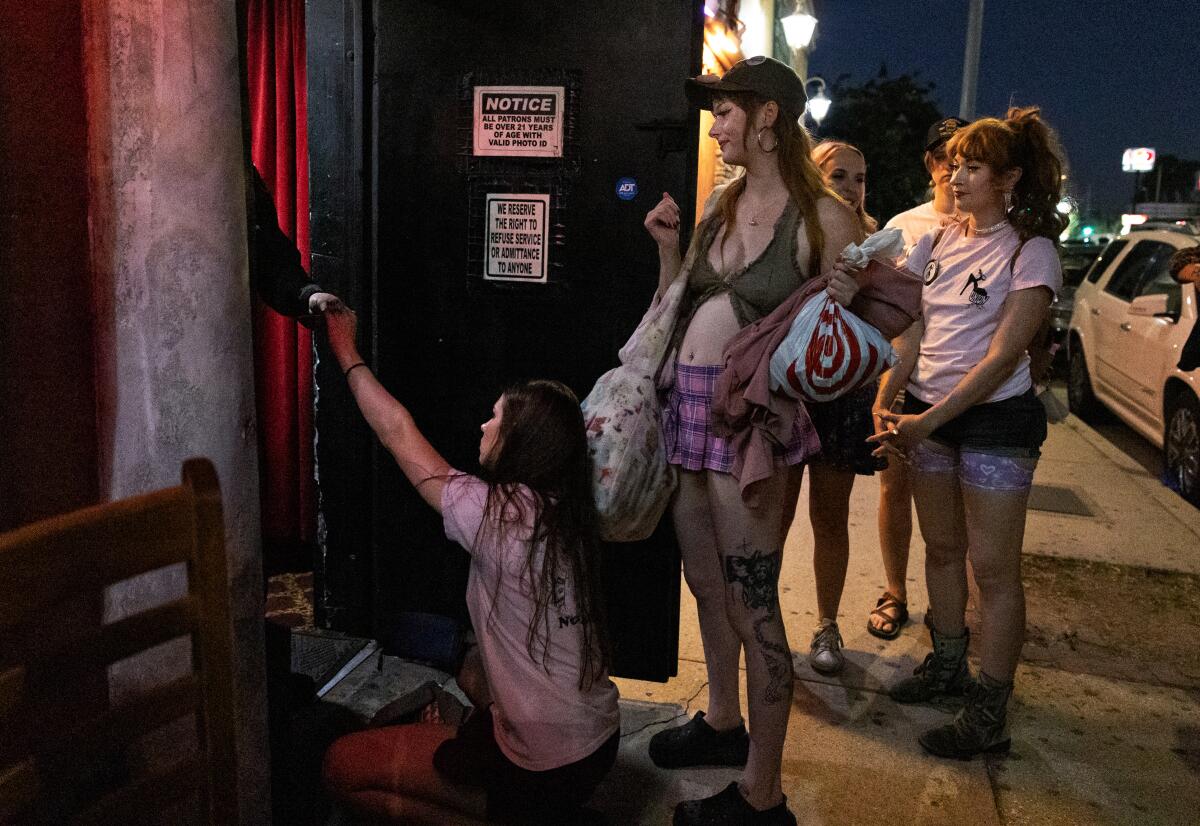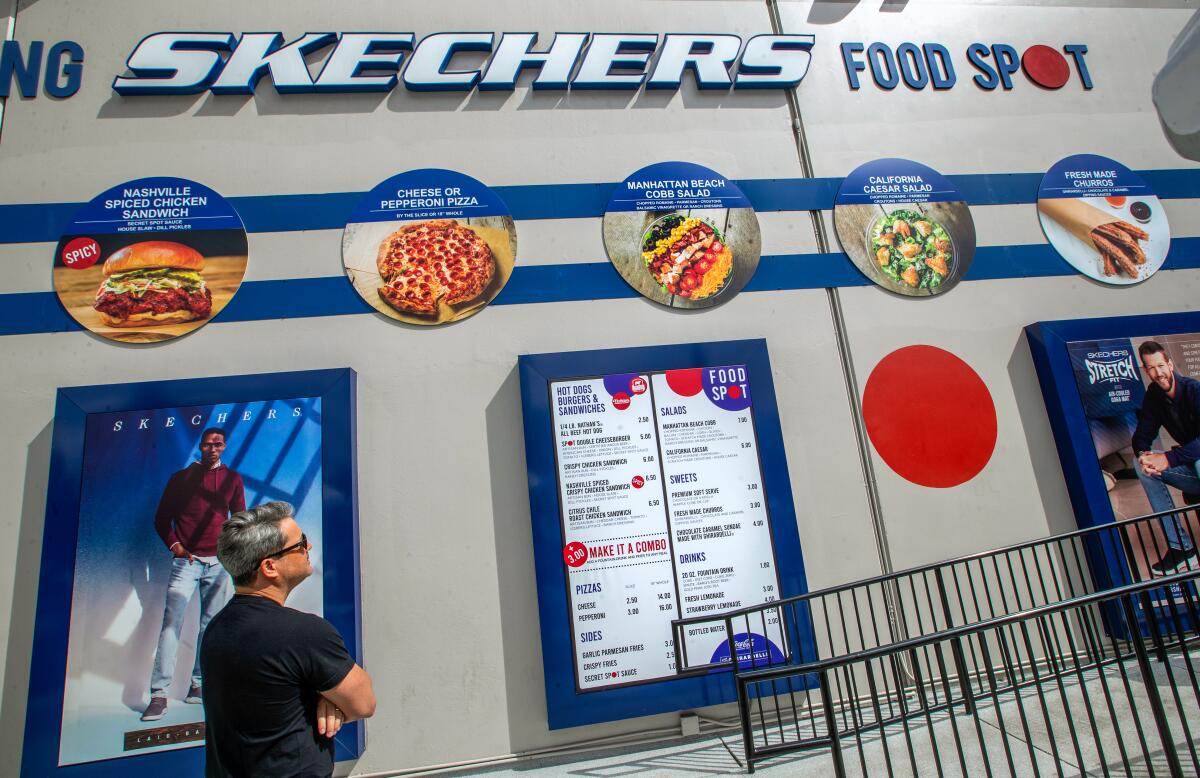What to know as California’s Kaiser Permanente workers go on strike
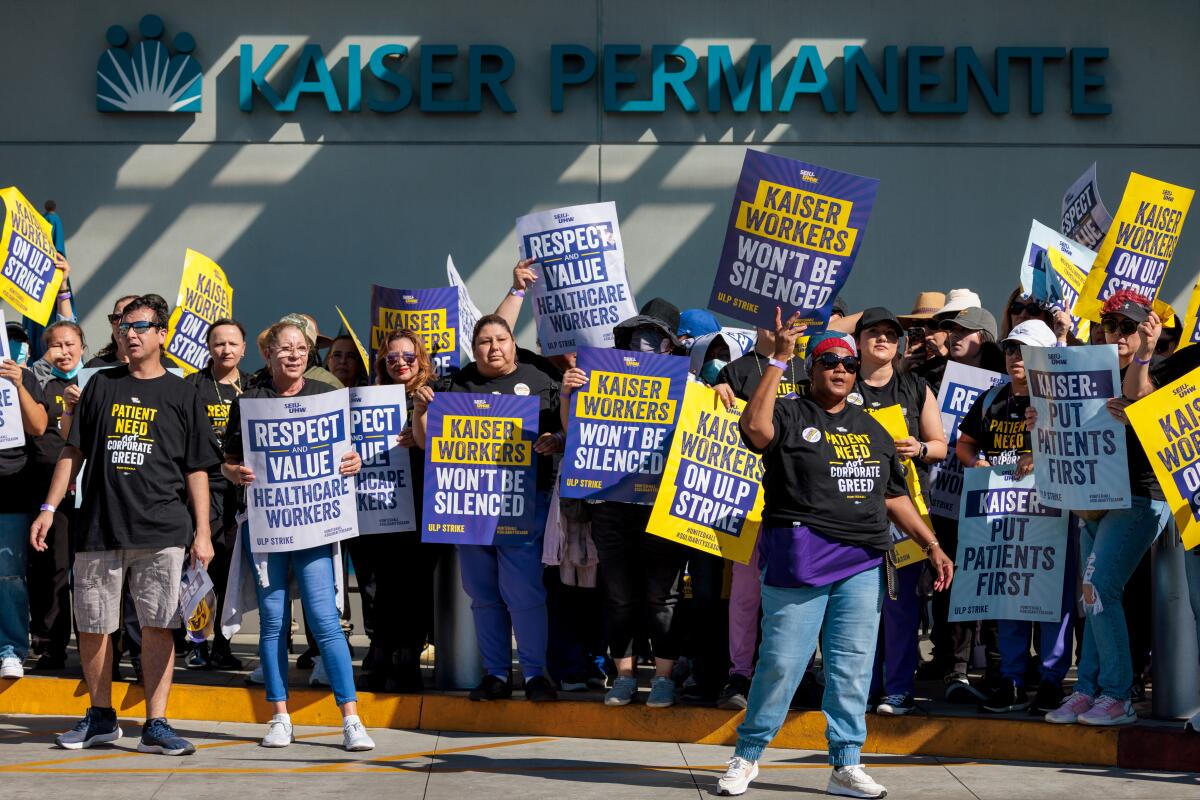
- Share via
Good morning. It’s Thursday, Oct. 5. Here’s what you need to know to start your day.
- What to know as Kaiser workers go on strike
- San Francisco pays tribute to Sen. Dianne Feinstein
- We tried everything at the Skechers food court
- And here’s today’s e-newspaper
Sign up for Essential California
The most important California stories and recommendations in your inbox every morning.
You may occasionally receive promotional content from the Los Angeles Times.
Kaiser workers walk out
Outside Kaiser Permanente centers across California, hundreds of front-line workers in purple union shirts walked out Wednesday morning in protest of unfair labor practices. They joined more than 75,000 others across the country.
Providing almost 5 million Californians with healthcare, the nonprofit is now witnessing the biggest strike in American healthcare history.
Here’s what you need to know.
Workers say they’re subject to unfair labor practices
Striking healthcare workers said they have been stretched thin, making it harder to provide patients with proper care. X-ray technicians, vocational nurses, phlebotomists, surgical technicians, respiratory therapists and certified nursing assistants are among the support staff who have walked out because they feel that Kaiser executives are not listening to their concerns.
Ju’anna Isaiah is a ward clerk transcriber at the Los Angeles Medical Center. She assists patients who are coming out of surgery and helps coordinate their care in the busy facility.
Due to short staffing, she said that clerical workers like her are finding it harder to get patients to their next destination.
“We’re not able to assist where we’re supposed to be, because we have to go somewhere else,” Isaiah told my colleague Emily Alpert Reyes on Wednesday morning. “If I’m not at one desk to answer the phone, somebody else has got to get that.”
This is a problem that began before the COVID-19 pandemic, she said.
Labor leaders from the Coalition of Kaiser Permanente Unions say that executives have engaged in “bad faith bargaining” while Kaiser says that it has negotiated in good faith.
“Front-line managers tell us ‘Do what you can,’” Isaiah told me. This makes her feel upset. “Are you kidding me? Did you hear me? We need help. It’s frustrating.”
Wages are also a source of tension
Workers said wages are not keeping up with their long and expensive commutes and costs of living.
While both sides have reached tentative agreements on issues such as the use of temporary workers and how employee vacancies are tracked, the coalition and Kaiser have clashed over minimum wages, including what labor leaders call a “divide-and-conquer strategy.”
The unions have asked for $25 as a minimum across the board starting in 2024, but Kaiser has proposed a $23-an-hour wage for California workers and $21 in other states. The company claims that it’s an industry leader on wages.
How the strike will affect patients
Kaiser has maintained that this strike, which is scheduled to last till the end of Friday, will cause “minimal disruption” to its patients.
Some laboratories in Southern California, including in Glendale and Baldwin Park, closed temporarily Wednesday, while the company said it has also brought in an unspecified number of replacement workers in key areas. Patients have also been advised to use mail-order services for medications.
Still, the strike comes as patients have complained of long wait times and struggled to get appointments for care, including the new COVID-19 booster shots. Caroline Lucas, a spokesperson for the Coalition of Kaiser Permanente Unions, says that there are no bargaining sessions scheduled at this time. “We will coordinate with Coalition leaders to reconvene bargaining as soon as possible,” Kaiser media representative Terry Kanakri wrote in a statement on Wednesday afternoon.
Union leaders have said that another strike could follow in November if the company and workers don’t reach an agreement.
Today’s top stories
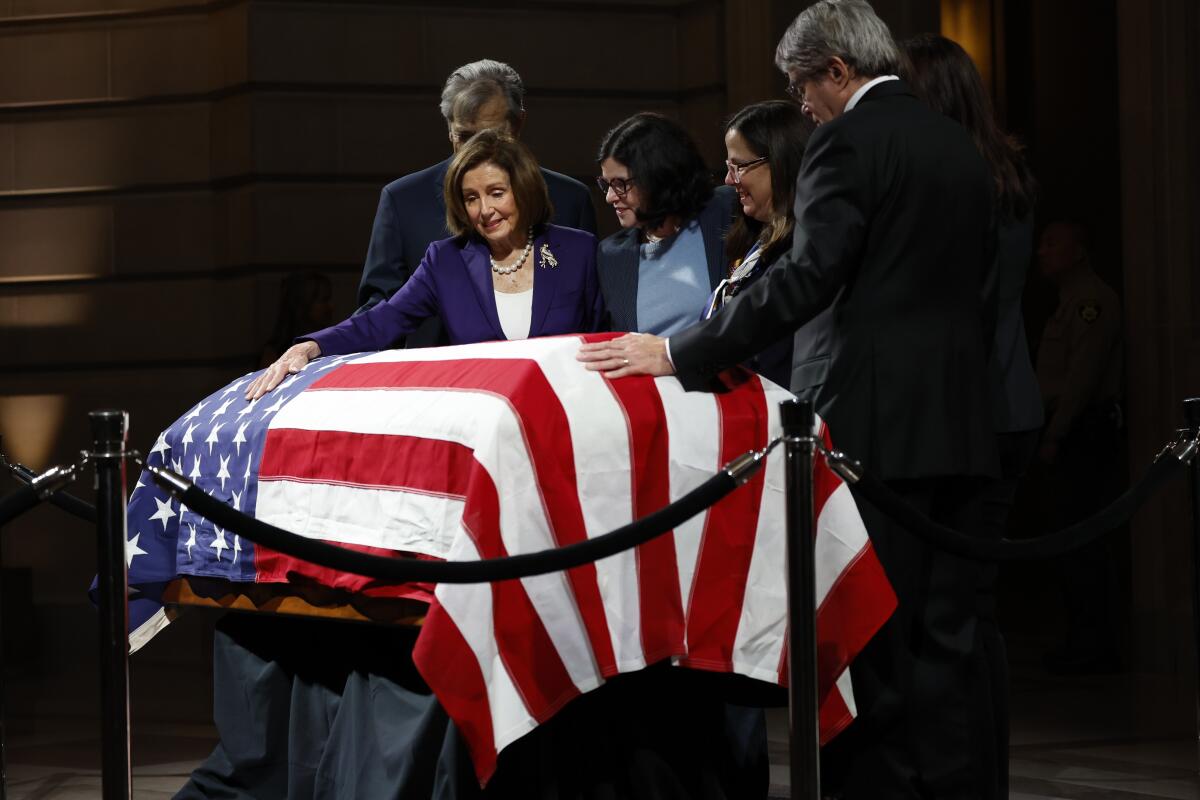
The latest in Congress
- San Francisco pays tribute to Sen. Dianne Feinstein in the city where she spent a decade as its first female mayor.
- Here’s what to know about Kevin McCarthy’s high-profile demotion.
- The interim House speaker’s first order is to boot Nancy Pelosi out of a Capitol office.
- In McCarthy’s hometown of Bakersfield, supporters cursed the scorched-earth politics in Washington that cost him his job as speaker of the House.
Climate and environment
- How hot can it get in SoCal? A heat wave will push temperatures into triple digits.
- The largest dam removal in history stirs hopes of restoring California tribes’ way of life.
Housing and homelessness in Los Angeles
- West Virginia has the nation’s worst drug problem, but much less homelessness than L.A.
- Eminent domain was used to evict a Chinatown family. Now it might help them stay housed.
Policing, crime and courts
- Recent controversies test LAPD Chief Michel Moore in the final years of his tenure.
- At Rosemead High, generations of students were harassed or groomed for sex as they tried to get an education, Insider reports.
- The use of jailhouse snitches in Orange County bungled at least 57 criminal cases, a public defender says.
- The suspect charged in rapper Tupac Shakur’s fatal shooting makes first court appearance in Las Vegas.
- Lady Gaga will not have to pay $500K to the woman who dated one of her dognapper’s dads and sued for the reward.
More big stories
- Los Angeles County wants to buy — and forgive — your medical debt.
- An L.A. City Council committee has backed a moratorium on breeding licenses for dogs, citing the overcrowding crisis at city-run animal shelters.
- California workers will see more paid sick time off under a new law.
- California metro areas place high on the list for Latinos with advanced degrees.
Get unlimited access to the Los Angeles Times. Subscribe here.
Commentary and opinions
- Bill Plaschke: Why the Dodgers will win the World Series.
- Jackie Calmes: McCarthy flopped, Gaetz mutinied, but blame the chaos on the entire Republican Party.
- Robin Abcarian: Will opponents of same-sex marriage ever give up? Even the pope is softening on the issue
- Mary McNamara: There’s nothing ‘courageous’ about ‘The Golden Bachelor.’
Today’s great reads
These L.A. strippers won a union. But the dance isn’t over. It’s a night of celebration and reconciliation that marks the end of a tumultuous 17 months during which club management fired more than a dozen dancers, contested the results of a union election held by its strippers, filed for bankruptcy and shuttered its doors. The peace turns out to be short-lived.
Other great reads
- In 1939, Armenians of Musa Dagh fled to Lebanon rather than submit to Turkish rule. Now they despair over the exodus from Nagorno-Karabakh and Azerbaijan.
- 54% of Latinos who don’t speak Spanish say they have been shamed because of it.
- ‘So many broken, beautiful people trying to pick themselves up’: Readers share their stories of substance abuse recovery.
- Autism silenced this L.A. teenager. It couldn’t stop him from creating a 70-minute symphony.
- After decades of legal battles, John Fogerty is finally free. Is it too late to find happiness?
How can we make this newsletter more useful? Send comments to [email protected].
For your downtime
Going out
- 🎨 Art made during — and despite — the pandemic informs the Hammer’s ‘Made in L.A.’ 2023 biennial.
- ✋ Art collective AMBOS brings its outreach to Made in L.A. with an interactive, outstretched hand sculpture.
- 🏠 Ludovic Nkoth’s new exhibition at the François Ghebaly gallery takes you from Cameroon to Paris in search of ‘home.’
- 👟 Food columnist Lucas Kwan Peterson has tried everything on the menu at the Skechers food court.
Staying in
- 📚 Is Madonna a game-changing feminist or capitalist come-on? A biography hashes it out.
- 📺 With ‘Young Love’ on Max, Matthew A. Cherry wanted to depict parents in their 20s who are still figuring out life.
- 📺 We watched seven different streamers’ Hispanic Heritage Month content. Here’s how they rank.
- 🧑🍳 Crab rangoon, anyone? Three recipes for these forgotten tiki bar appetizers.
- ✏️ Get our free daily crossword puzzle, sudoku, word search and arcade games.
And finally ... from our archives
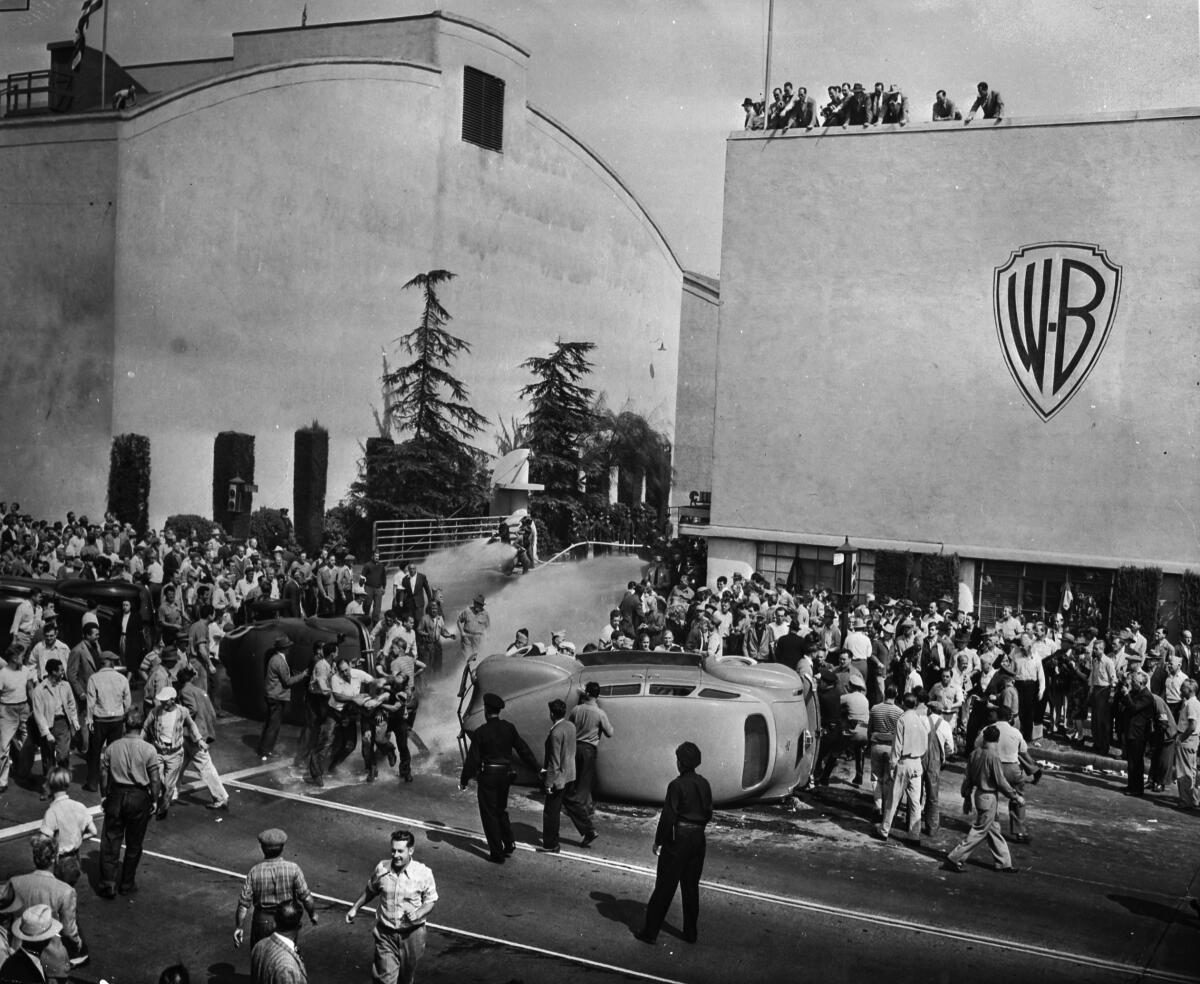
Oct. 5, 1945, is known as Hollywood’s “Bloody Friday.” In a tale of labor conflicts past, rival unions representing Hollywood workers disagreed on whether to strike and ended up in conflict against each other.
The 10,500-member Conference of Studio Unions had been on strike for six months as the patience of the 12,000-member International Alliance of Theatrical Stage Employees, which did not strike, ran thin. On Oct. 5, 1945, the studio unions tried to block the Warner Bros. employee entrance and violence erupted among strikers, non-strikers and the police officers who intervened. At least 25 people were injured, according to The Times. The strike ended with a labor agreement later that month. Read more about the incident here.
Have a great day, from the Essential California team
Helen Li, reporting fellow
Elvia Limón, multiplatform editor
Laura Blasey, assistant editor
Karim Doumar, head of newsletters
Check our top stories, topics and the latest articles on latimes.com.
Sign up for Essential California
The most important California stories and recommendations in your inbox every morning.
You may occasionally receive promotional content from the Los Angeles Times.
